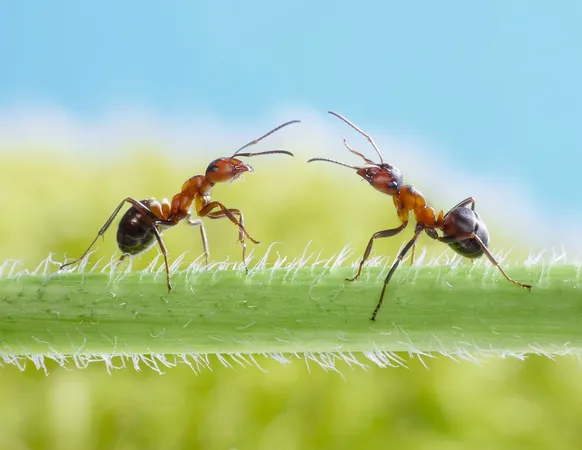
Incredible Ants: They Hold Grudges Just Like Us!
2025-01-13
Author: Nur
Ants are often seen as simple creatures, moving instinctively without much thought. However, groundbreaking research is flipping this perception on its head! A team of biologists has discovered that ants, much like humans, can learn from their experiences and even hold grudges against rivals.
Dr. Volker Nehring, an academic counselor at the University of Freiburg in Germany, recently co-led this fascinating study with doctoral student Mélanie Bey. They sought to unravel the emotional complexity hidden within these tiny beings.
In their experiment, the researchers placed different groups of ants in confrontations with rivals from other nests. The findings were remarkable: ants that had previously encountered aggressive rivals exhibited noticeably more aggression during new encounters with the same group. Conversely, when they encountered ants from another nest that they had previously learned were passive, these ants showed a significant reduction in aggressive behavior.
Ants can tell each other apart using odors, as each nest emits its own unique scent. This olfactory recognition plays a crucial role in their aggression levels toward rival groups. Historically, it was noted that ants often exhibit the most aggression toward their immediate neighbors, suggesting a strategy of territorial defense. This study provided a clear reason for this behavior—remembering previous encounters allows ants to strategize their interactions based on familiarity and past experiences.
The experimental design involved two phases. In the first, groups of ants faced off against either their own nestmates, aggressive intruders from rival nests, or did not engage in aggressive encounters at all. The second phase revealed that those ants who had previously encountered aggressive rivals were significantly more aggressive when meeting them again. Even altering the experience by temporarily rendering some rival ants passive (by cutting off their antennae) led to reduced aggression when previously aggressive encounters were reintroduced.
But this fascinating research doesn’t stop here! Dr. Nehring and his team plan to investigate how these learned experiences affect the ants' olfactory receptors. This could deepen our understanding of how ants adapt and modify their behaviors based on their interactions, shedding light on the broader spectrum of emotions and intellect present in the insect world.
The study, titled "Associative learning of non-nestmate cues improves enemy recognition in ants," published in *Current Biology,* challenges our views on animal intelligence and behavior. Who knew that our tiny six-legged neighbors could be so complex? Next time you see an ant, remember: there's more going on beneath that exoskeleton than you might think!

 Brasil (PT)
Brasil (PT)
 Canada (EN)
Canada (EN)
 Chile (ES)
Chile (ES)
 Česko (CS)
Česko (CS)
 대한민국 (KO)
대한민국 (KO)
 España (ES)
España (ES)
 France (FR)
France (FR)
 Hong Kong (EN)
Hong Kong (EN)
 Italia (IT)
Italia (IT)
 日本 (JA)
日本 (JA)
 Magyarország (HU)
Magyarország (HU)
 Norge (NO)
Norge (NO)
 Polska (PL)
Polska (PL)
 Schweiz (DE)
Schweiz (DE)
 Singapore (EN)
Singapore (EN)
 Sverige (SV)
Sverige (SV)
 Suomi (FI)
Suomi (FI)
 Türkiye (TR)
Türkiye (TR)
 الإمارات العربية المتحدة (AR)
الإمارات العربية المتحدة (AR)